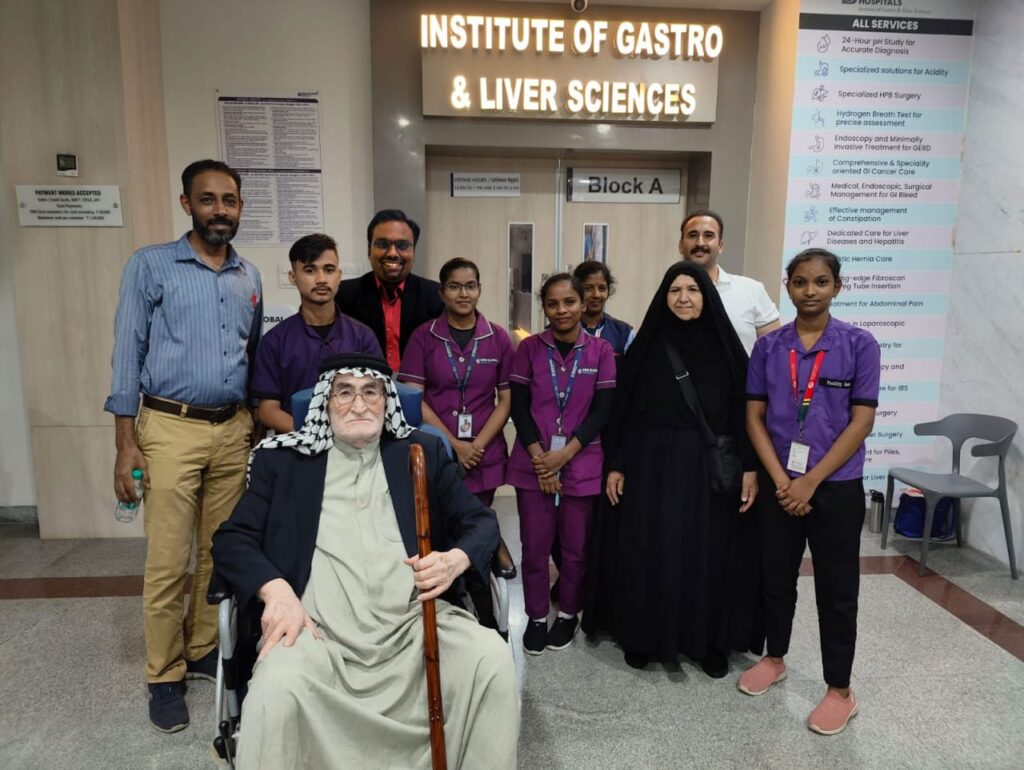 Chennai, November 14th 2025: SRM Global Hospitals successfully restored urinary function in a 74-year-old male patient from Iraq who was suffering from obstructive urinary symptoms caused by Benign Prostatic Enlargement (BPE), a non-cancerous increase in the size of the prostate gland that commonly affects elderly men. Taking into account the patient’s severe coronary artery disease and his dependence on blood-thinning medication, the urology team opted for advanced holmium laser technology for the removal of the enlarged prostate tissue, thereby avoiding the risks associated with conventional invasive surgical procedures.
Chennai, November 14th 2025: SRM Global Hospitals successfully restored urinary function in a 74-year-old male patient from Iraq who was suffering from obstructive urinary symptoms caused by Benign Prostatic Enlargement (BPE), a non-cancerous increase in the size of the prostate gland that commonly affects elderly men. Taking into account the patient’s severe coronary artery disease and his dependence on blood-thinning medication, the urology team opted for advanced holmium laser technology for the removal of the enlarged prostate tissue, thereby avoiding the risks associated with conventional invasive surgical procedures.
The procedure, known as Holmium Laser Enucleation of the Prostate (HoLEP), is an advanced, minimally invasive laser surgery technique. Unlike Transurethral Resection of the Prostate (TURP), which is the conventional gold standard, HoLEP offers significant advantages, including minimal bleeding, shorter hospital stay, and faster recovery.
The surgical team was led by Dr. Anand Krishnamoorthy and Dr. M. Deepak, Senior Consultant Urologists, supported by Dr. Varun C., Senior Consultant Anaesthetist. Dr. T. R. Muralidharan, Cardiologist, conducted the pre-surgical cardiac evaluation and formulated the cardiac management plan.
In his comments, Dr. P. Sathyanarayanan, President, SRM Global hospitals, said, “Advanced urological procedures like HoLEP represent the technological and clinical progress now taking place at SRM Global Hospitals, where it was successfully performed on a severely cardiac-compromised patient. The surgery used advanced holmium laser technology under continuous monitoring and required coordinated support from a multidisciplinary team. Despite a high risk of on-table heart attack, the procedure was completed safely through meticulous pre-operative planning and intra-operative management. This case highlights the precision and collaboration involved – the urologists performed the HoLEP procedure, the cardiologists oversaw pre- and post-operative cardiac care, the anesthesiologists ensured real-time stabilisation, and the ICU team provided diligent postoperative monitoring. The case validates SRM Global Hospitals’ commitment to delivering safe, advanced care in challenging scenarios.”
In his comments, Dr. Anand Krishnamoorthy said, “The patient from Iraq arrived with severe urinary issues. Tests showed elevated PSA levels, prompting an MRI and biopsy that confirmed benign prostate enlargement, ruling out cancer. During pre-surgical evaluation, we found severe cardiac blockages. Although cardiac intervention was advised first, the patient wished to proceed with prostate surgery so he could resume prayers without urinary difficulty. With careful pre-surgical preparation and advanced cardiac monitoring, we safely performed Holmium Laser Enucleation of the Prostate (HoLEP). The minimally invasive laser procedure allowed precise tissue removal with minimal bleeding and a fast recovery. The patient responded well, was discharged in stable condition, and remains symptom-free under regular follow-up.”
Talking about BPE and its causes, Dr Anand said that this condition affects nearly 50–60% of men above 60 years of age, making it one of the most common urological conditions in elderly men. It occurs primarily due to age-related hormonal changes that cause the prostate tissue to grow. Common warning signs include frequent urination at night, weak urine flow, straining during urination, or a feeling of incomplete bladder emptying. These symptoms should not be ignored, as timely diagnosis and treatment can prevent the condition from progressing to severe obstruction that might require surgical intervention. “Men above the age of 50 should undergo regular health check-ups and seek early medical consultation if they experience urinary difficulties. Maintaining optimal blood pressure, blood sugar, and cholesterol levels also helps reduce the risk of prostate-related complications.”

